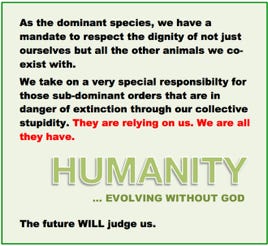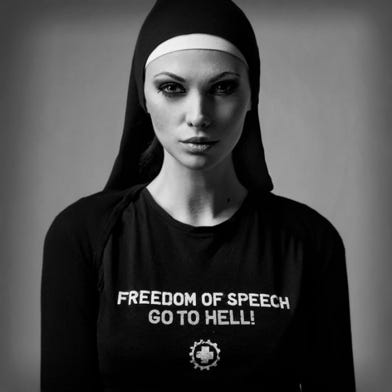The background image is from our Nottingham garden
Expletives (may offend some)
We would probably all agree that expletives or profanities are used for a variety of reasons. For example, emotional effusion, rapport or bonding with peers, complementing a serious lack of word power and as abuse, intending predominantly to offend.
They normally have context and purpose. The same profanity I might use fairly naturally with my friends, could be considered upsetting or inappropriate by a casual acquaintance but completely out of the question and quite unacceptable, when used in the company of an elderly maiden aunt.
“I've been accused of vulgarity. I say that's bullshit.” Mel Brooks
When being dealt a sudden shock, as when hammering a thumb instead of a nail, an issued expletive can be used out of context yet often be seen as appropriate, since it has the purpose of covering or camouflaging the pain and shock. Like many other things, profanities are subject to their own version of relativity theory. Senders and receivers can observe different versions of the same thing.
“Holy shit," I breathed. “hellhounds." "Harry," Michael said sternly. "You know I hate it when you swear." "You're right. Sorry. Holy shit," I breathed, "heckhounds.” Jim Butcher, Grave Peril
It is well known that hurling insults using extreme profanities can inflict severe psychological stress on the target and bystanders. I shudder to think of the damage done to the little boy, sitting on her knee, when this lady unleashed a tirade of racist abuse on Tube passengers. http://bit.ly/1OJ5zyP. Many of the expletives used were demonstrably through lack of language power exacerbated by her possibly drunken or drugged state.
“Obscenity and profanity have no meaning … other than emotional expressions of inarticulate people with small vocabularies.” Betty Smith: A Tree Grows in Brooklyn
A particular example of emotional outpouring is the Ricky Gervais tweet embedded below.
Ricky feels very strongly, as incidentally I do, about animal dignity and rights and chooses to show his strength of feeling by using an expletive that he knows will shock and grab attention. I have to admit I was offended by the use of this particular word in the context of a public forum. The qualms I have are with the word’s connotations. It is vulgar slang for female genitalia and is being used here to describe someone in a derogatory way as unpleasant, stupid or obscene. Francis Grose’s 1785 ‘A Classical Dictionary of The Vulgar Tongue’ gets right to the point by describing the word as "a nasty name for a nasty thing”. This is precisely what I find unacceptable; the consideration of a normal part of the female anatomy as ‘nasty’, which I think is disrespectful to women and is grounded in primitive, traditional male ignorance. This is my objection to the use of this particular word.
I need to add however, that although I find this particular word offends me (for the reasons given), I would defend the right of Ricky or anybody else’s free expression in using it. I accept being offended and reserve the right to say so and to state my reasons. My case is simply that in most circumstances the English language is rich enough to be able to express ideas in a much richer way than a perceived crude expletive can.
So, here are a few alternatives for Ricky, if he so chooses to consider them: “If you enjoy seeing an animal terrified or in pain,
you …
- … are a mindless, unsophisticated ignoramus
- … an execrable member of your species
- … are sadly lacking in empathy
- … are unpleasant, stupid and obscene
- … are not taking your dominant species’ responsibilities seriously
All of the above are describing ones feelings in a more meaningful and precise way than a coarse expletive can, but of course not with the same sledgehammer force.
That bastion of the Mormon faith, Spencer W Kimball, proclaimed, in a surprising feat of logical reality: “Profanity is the effort of a feeble brain to express itself forcibly.”
There are times however when an expletive can encapsulate the feeling you are trying to convey quite succinctly and precisely and be quite difficult to better. Lenny Bruce showed this beautifully in his ‘throw away’ remark: “If you can't say ‘Fuck’, you can't say ‘Fuck the government’.” … and of course, that would be truly tragic.
Free speech
“The censor's sword pierces deeply into the heart of free expression.” Earl Warren
It is true that the first casualty of a totalitarian regime is the free flow of ideas, most especially those that question its authority or tenets.
This is particularly evident in the single unreformed Abrahamic religion, Islam. It is deeply offended when criticised since it is a ‘faith regarded as revealed through Muhammad as the Prophet of Allah’ and is thus incontestable. The Quran is everything that you need to live your life of worship, so what call for expressing critical ScoreVs of what it says?
“What is freedom of expression? Without the freedom to offend, it ceases to exist.” Salman Rushdie
Free Speech is essential in the discussion and critical examination of ideas. As soon as it is stifled, there is no scope for public examination of alternatives and consequently change to the current order by consensus becomes impossible. It is used as a control device by autocratic regimes to keep the status quo. Islam is a prime example of this and so will always be rooted in the brutal morality of the 7th century, unable to change and ISIS encompasses this with some relish as the model for its barbaric regime.
Under the banner of free expression, ‘Holocaust deniers’, and others whose ScoreVs seem to fly in the face of reality, must be allowed to be heard. Their own utterances will in the end disbar them from being taken seriously in a free and informed society. I believe we should not legislate against opinions such as these, no matter how ridiculous they seem, simply on the basis of offence, no matter how deep or heartfelt. However, fourteen European countries have now made Holocaust denial illegal and this has dealt the true concept of free speech a heavy blow. The UK expert ‘against racism and intolerance’, Michael Whine, has said that persecuted minorities: “are best protected in open and tolerant democracies that actively prosecute all forms of racial and religious hatred."
Surely the essence of an open and tolerant society is allowing the free expression of ScoreVs even when they may displease, insult or even distress.
“You have the right to be offended but you have no right to demand that I do not offend you”, asserts Maajid Nawaz in his excellent ‘Free Speech’ video http://bit.ly/1PAsLfE. It is a ScoreV that I entirely subscribe to. Great reformers and philosophers have always offended or ‘blasphemed’ against accepted norms and Maajid believes, as do I, that freedom to speak represents our freedom to think.
Of course, freedom of speech and expression will always have limits. The US First Amendment guarantee of free speech and expression as recognized by the Supreme Court is a limited one. You will be prosecuted for incitement, obscenity and threats, for example. There is a broad sweep of exceptions under The Human Rights Act incorporated into UK law including words or behaviour intending or likely to cause harassment, alarm or distress or cause a breach of the peace and also included is incitement to terrorism.
The dangers of curtailing free speech are far greater than those in accepting the consequences of personal expression within the law.


